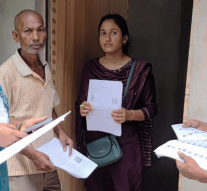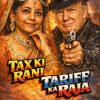Goa is abuzz with excitement as vintage bike and car owners, users, collectors and fans are decking […]

SIR, It’s My Vote
Uncategorized November 14, 2025By Praveena Sharma
As the special intensive revision (SIR) kicks off in Goa, uncertainty, and haze surround the exercise
An extensive exercise of verifying registered voters across Goa, based on the 2002 electoral roll – when the last intensive electoral revision was carried out in the State, is underway. It’s called the special intensive revision (SIR).
Some 1,735 block level officers (BLOs) – government employees working for Election Commission of India (ECI) at the polling booths – are going around knocking on the doors of around 11.85 lakh electors who were on the voter list till October 27.
They began the exercise of distributing enumeration forms to all electors on November 4 and are expected to assist voters in filling up the forms. Then, they will scrutinize, digitise and upload them on the ECI website by December 3.
And so, when their BLO App glitches, they run helter-skelter. At the other end, some “rogue BLOs” are allegedly conniving with the some “rogue mamlatdars” – land revenue officer at the district level – to intentionally keep some voters out of the electoral rolls.
In the backdrop of 47 lakh voters reportedly getting erased from Bihar’s voter list during the SIR, it’s playing havoc with electors and political parties alike in Goa.
Congress leader Elvis Gomes said the way the exercise was being conducted, an estimated at least 15%-20% voters could be left out. He believes a tiny State like Goa, where annual supplementary electoral revisions have been an ongoing process, does not need an SIR at all.
Much before it was undertaken, Gomes had detected mass replacement of BLOs in Panjim. He took up the issue with the ECI in Delhi and the Chief Electoral Office (CEO) in Panjim and eventually got the replacement order revoked.
“I successfully managed to stop that (mass replacement) order. There was no justification for the mass replacement of BLOs from only one constituency (Panjim),” he informed.
Durgadas Kamat, General Secretary of Goa Forward Party (GFP), also accused some BLOs of not giving enumeration forms to some people in his constituency Fatorda.
“There is a very serious issue about some BLOs, who are aligned to the ruling party (BJP). They are not giving enumeration forms to our people in Fatorda,” he said.
He addressed the concern in a meeting with chief election officer (CEO) Sanjay Goel on November 12 and it was immediately taken care of.
“He (CEO Goel) called up the collector in front of me and asked him to address it. He also informed me that he had warned the BLOs and told them it is repeated they will be suspended,’ said GFP leader.
Kamat said the problem of BLOs being selective, and “playing mischief”, in the distribution the forms, was widespread in Goa.
To counter such issues, his party has now set up helpdesk and engaged its own booth level agents (BLAs) to assist in distribution and collection of enumeration forms.
Girish Chodankar, former president of Goa Pradesh Congress Committee (GPCC), said Congress was trying to reach out to its voters through the BLAs.
“Each booth comprises of around 700-900 voters. They will need technical and legal help. Through BLAs, we are trying to reach out to the voters. If they are facing any difficulty, the BLAs will help them to get the document ready,” he said.
Gomes is also not leaving things to chances. He is keeping a close watch on “rogue BLOs” and “rogue mamlatdars”
“Not every BLO, but there are some rogue BLOs. If they get a mamladar who is also a rogue, it can play havoc with the system. Nobody will be able to do anything because the realisation (come to notice) will come very late,” he warned.
The Congress leader said the chances of missing out an elector was, particularly, high in Goa because a high percentage of Goans work outside the State or abroad but retain their Indian citizenship.
Exploding the myth about most Goans take foreign citizenship, he said most Goans living abroad continue to be Indian citizens with voting rights. Gomes fears these people could end up being excluded from SIR’s electoral roll.
“I would put the ratio of 1:2; if there is one Goan foreign citizen then there are two Goan Indian passport holders, who are eligible to vote in the country,” he said.
The electoral revision has been undertaken under Article 324 of the Constitution of India, Section 21 of the Representation of the People Act, 1950 and Registration of Electors Rules, 1960.
Cleofato Almeida Coutinho, a leading advocate in Goa, said constitutionally, there was no problem with SIR. However, the way it is being conducted raises the question of whether the ECI is “enjoined with the responsibility of questioning people’s citizenship”.
“I (an elector) should not be asked to show documents that prove I am an Indian citizen. It should be presumed that I am a citizen. It should be the burden of the election commission to prove that I am not a citizen of the country. It cannot be the other way around,” he reasoned.
According to him, the election commission is not enjoined with the responsibility of deciding citizenship.
“It (ECI) may have the responsibility of preparing a pure and clean electoral roll but not of proving a voter’s citizenship. Issues of citizenship must be decided by the MHA (ministry of home affairs). If there is no dispute, and if somebody is on the roll then it should be presumed that he is a citizen because he is already on the (electoral) roll,” Coutinho said.
Congress’s Gomes sees a conspiracy in the current SIR electoral rolls being referenced 2002 electoral rolls, when late Manohar Parrikar was the chief minister and late Atal Behari Vajpayee was leading the government at the Centre. A similar exercise was undertaken then and resulted in removal of many names from electoral roll.
“They (BJP in 2002) had deleted many voters in 2002. Those people and their relatives will find it difficult to fill their enumeration forms,” he said.
Block Level Officer (BLO) Is Your Man For SIR
• As the extensive process of Special Intensive Revision (SIR) – involving enumeration, verification, and enrolment of voters – kicks off, BLOs will play a crucial role in it all.
• A BLO is a field representative of the Election Commission of India (ECI) and serves as the contact point for voters.
• He will make a door-to-door visit to distribute the enumeration forms to existing voters in his block area and hand over two pre-filled enumeration forms.
• Guide the voter to fill the form and help him map his electoral details with 2002 SIR and then help him match or link them with his or relative’s name.
• A voter can book a call with BLO at 1800-11-1950 to check his and his parent’s 2002 SIR details.
• After voters fill the two copies of enumeration forms and attach their recent colour photographs, they must return one filled enumeration form to the BLO and keep the second one with themselves after obtaining a receipt for it.
• BLO will verify voter’s identity, age and address within the assigned part or polling area.
• He will also help new voters fill out Form 6 (new registration) and verify and process requests for deletion (Form-7), correction (Form-8) and shifting (Form-8A).
• He has been tasked to ensure no duplicate or fake entries remain on the roll.
• Once the draft electoral rolls are scrutinised, the BLO will display them at designated locations (schools, Panchayat office, and others).
• He will coordinate with electoral officials and work under the Electoral Registration Officer (ERO) or Assistant ERO.
• He will maintain an updated BLO register with details of each voter., along with maintaining the confidentiality and accuracy of all records.
• He will help marginalised and first-time voters to enrol.
Important Dates to Keep in Mind for SIR
• House-to-House Enumeration Phase – November 4 to December 4
• Publication of Draft Electoral Roll – December 9
• Claims and Objections Period – December 9 to January 8
• Notice Phase (Hearing & Verification) – December 9 to January 31, 2026
• Publication of Final Electoral Roll – February 7, 2026
Brief History of Goa’s Suffrage
Goa, under Portuguese rule (1510-1961), did not have democratic election system. In the early colonial period, till 1820, the State’s governance remained in the hands of the Portuguese royalty and later moved to Estado da India Portuguesa or Portuguese State of India.
During this period, the King appointed the viceroy or governor-general in Goa. People living in the State had no political representation or voting rights. Portuguese officials, military officers, and the church managed the local administration.
It was only around the mid-nineteenth century that Goa got limited representation after Portugal became a constitutional monarchy in 1820. In 1836, when the Overseas Organic Law was introduced, it allowed partial representation to local elites.
The law had provisions for their participation in the State’s governance. This benefited mostly the Catholic families, who could be elected to Municipal Councils (Camara Municipais) and Provencial Councils (Juntas Provinciais).
Only a handful of men – owners of property, educators, and those in higher tax bracket – could vote. The number of total electorates could have been in a few hundreds.
Under the new system, Goa has a few representatives (deputadoes) in the Portuguese Parliament in Lisbon (Cortes). Elections were controlled and manipulated by the colonial authorities.
Then came the Estado Novo era (1933-1961), marked by dictatorship and controlled elections. Under Antonio de Oliveira Salazar, Portugal became an authoritarian state. Election became a farce. It existed on paper but regime’s official party – Uniao Nacional – was the only legal party.
Only Goans, who took Portuguese citizenship (assimilados) and committed their loyalty to Lisbon, were eligible to vote.
This sparked a national revolution (1940-61), ending in liberation of Goa in 1961. It was only after Goa was integrated into India it got a truly democratic elections system.
A Step-by-Step Guide for Checking Your Details on Electoral Rolls 2002
STEP1 – Go to the website https://ceogoa.nic.in/
STEP2 – In the drop-down menu, click on Electoral Roll PDF 2002. Fill details of district and assembly constituency (AC) and then click on Show.
STEP3 – It will take you to a list of AC Number, Part Number, Polling Station Name and Link. Click on your Part Number and Polling Station Name and download the link. Once it’s downloaded, check for yours, your parent’s, or relative’s details.
How to Fill Online SIR form?
STEP1 – Go to website https://ceogoa.nic.in/ and click on ‘Fill Enumeration Form’
STEP2 – Login and fill details such as EPIC number of the voter, registered mobile number, or email ID. Enter Captcha code and generate one time password (OTP) and submit.
STEP3 – Choose Goa from a drop-down menu.
STEP4 – Once you choose a State, you must provide your EPIC number.
STEP5 – This will take you to a page with all your details – elector’s name, serial number and other
such details. Ensure the details are correct. It should match the name in Aadhaar card. Fill all the details and submit.
If the details do not match then the elector can call the booth level officer (BLO), whose number is mentioned at the bottom of the pre-filled form. The BLO will assist the elector and address his concerns.














